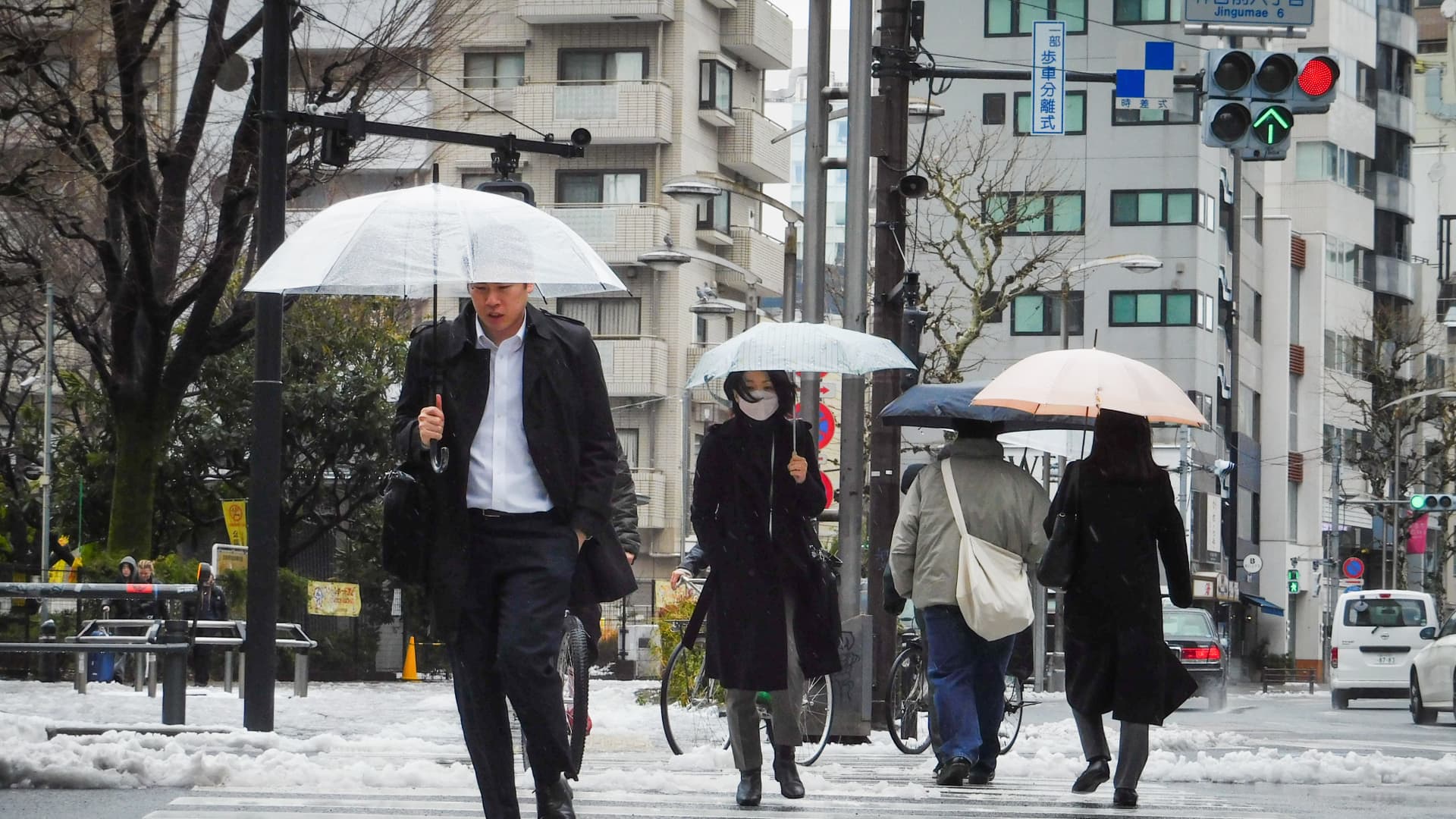Pedestrians cross an intersection in the Shibuya district of Tokyo, Japan, on Tuesday, Feb. 6, 2024.
Bloomberg | Bloomberg | Getty Images
Japan stocks confirmed a bear market on Monday as Asia-Pacific markets continued the sell-off from last week, with the Nikkei 225 and Topix dropping over 12%.
The benchmark indexes have fallen more than 20% from their all-time highs on July 11.
The 12.4% loss on the Nikkei — which saw it close at 31,458.42 — was the worst day for the index since the “Black Monday” of 1987. The loss of 4,451.28 points on the index was also the largest in terms of points in its entire history.
The Nikkei erased all its gains so far this year, moving into a loss position.
The broad-based Topix also saw a rout as it tumbled 12.23% and closed at 2,227.15.
Heavyweight trading houses such as Mitsubishi, Mitsui and Co, Sumitomo and Marubeni all plunged over 14%, with Mitsui losing almost 20% of its market cap.

Monday’s decline follows Friday’s rout when Japan’s Nikkei 225 and Topix fell more than 5% and 6%, respectively.
In Monday trading, the yen also strengthened to its strongest level against the dollar since January, and was last trading at 142.09.

South Korea’s Kospi fell 8.77%, closing at 2,441.55, and the small-cap Kodaq tumbled 11.3%, ending at 691.28.
Due to the magnitude of the sell-off, the exchanges hit circuit breakers, halting trade for the Kospi index at 2.14 p.m. Seoul time and at 1.56 p.m. for the Kosdaq. The halt was for 20 minutes. Circuit breakers are activated if stocks rise or fall 8%.
Investors, meanwhile, awaited key trade data from China and Taiwan this week, a well as central bank decisions from Australia and India.
China’s service sector expanded at a faster pace in July, with the country’s purchasing managers’ index climbing to 52.1 in July, up from 51.2 in June.
The Caixin survey said the acceleration of growth was due to faster new business growth, “supported by sustained improvements in underlying demand conditions and an expansion of services offerings.”
Taiwan’s benchmark index, the Taiwan Weighted Index, was down over 8%, dragged by tech and real estate stocks , while Australia’s S&P/ASX 200 fell 3.7% to 7,649.6.
The Reserve Bank of Australia kicks off its two-day monetary policy meeting Monday. Economists polled by Reuters expect the central bank to hold rates steady at 4.35%, but markets will monitor the monetary policy statement for clarity on whether the RBA is still considering a rate hike.
Hong Kong Hang Seng index was down 1.62% as of its final hour of trade, while mainland China’s CSI 300 fell 1.21% to 3,343.32, seeing the smallest loss in Asia.
On Friday in the U.S., stocks fell sharply as a much weaker-than-anticipated jobs report for July ignited worries that the economy could be falling into a recession.
The Nasdaq was the first of the three major benchmarks to enter correction territory, down more than 10% from its record high. The S&P 500 and Dow were 5.7% and 3.9% below their all-time highs, respectively.
The S&P 500 dropped 1.84%, while the Nasdaq Composite lost 2.43%. The Dow Jones Industrial Average fell 610.71 points, or 1.51%.
—CNBC’s Pia Singh and Hakyung Kim contributed to this report.

